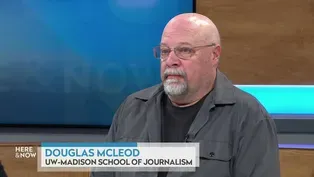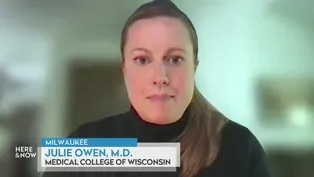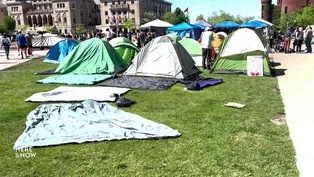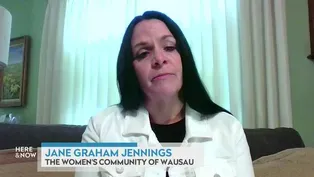Here and Now
William Gardner on the Ho-Chunk Nation and Cannabis Laws
Clip: Season 2200 Episode 2243 | 5m 26sVideo has Closed Captions
William Gardner on the Ho-Chunk Nation voting to decriminalize cannabis on tribal lands.
Ho-Chunk Nation Attorney General William Gardner discusses the tribal legislature voting to decriminalize cannabis on its lands and how this action intersects with state and federal marijuana laws.
Here and Now
William Gardner on the Ho-Chunk Nation and Cannabis Laws
Clip: Season 2200 Episode 2243 | 5m 26sVideo has Closed Captions
Ho-Chunk Nation Attorney General William Gardner discusses the tribal legislature voting to decriminalize cannabis on its lands and how this action intersects with state and federal marijuana laws.
How to Watch Here and Now
Here and Now is available to stream on pbs.org and the free PBS App, available on iPhone, Apple TV, Android TV, Android smartphones, Amazon Fire TV, Amazon Fire Tablet, Roku, Samsung Smart TV, and Vizio.
Providing Support for PBS.org
Learn Moreabout PBS online sponsorship>> Yeah.
All right.
Professor McCleod, thanks very much.
>> Thank you very much.
>> Ho-Chunk nation's legislature moved to decriminalize cannabis on its tribal lands.
It's a move, they say, that doesn't fully legalize marijuana.
Still, it raises legal questions as the drug is still illegal federally and in Wisconsin.
Joining us to address these questions is the Ho-Chunk Nation Attorney General William Gardner.
And thanks very much for being here.
>> Thanks for inviting me.
>> Tell me why did the Ho-Chunk vote to decriminalize cannabis?
>> It has been in the.
Process of considerations by the Ho-Chunk nation since 2015.
In 2015, the General Council got together and made a request that the legislature consider and research moving into, the marijuana field in the sense of what can they do for economic expansion, at that point in time , there was a start of a process , and then the commitment was made that they would continue to do the research.
And in an effort to put the nation in the best possible position once and if any form of legalization occurred, they moved forward with that effort, which has been continuing over the years with decriminalizing, marijuana within the Ho-Chunk nation statutes more than likely to begin, preparing for the potential of the change of, the marijuana rules under the Controlled Substance Act from a schedule one to a schedule three.
Drug.
So, it's all been positioning, and this is, for the most part, groundwork.
>> How does decriminalizing cannabis on tribal lands Square with state and federal law under which it remains illegal?
>> The decriminalized ation, as you may know, or as others may not know, basically removes the potential for a, crime violation or a conviction of a crime from somebody who may be arrested or charged with a crime under the current, codes, all of the all of the illegalities of using marijuana are still in effect throughout the state of Wisconsin, as well as, through the Ho-Chunk lands.
But if the tribal member is, in possession of an amount of marijuana on tribal lands, the decriminalization affects that individual by the tribal police, not, filing a criminal charge against that individual.
And they wouldn't have to.
Look, I should say, look forward to his wrong word, but they wouldn't have to worry about getting a criminal record that might affect education or housing applications or things of the sort.
So that's something that, we see as, a benefit to a tribal members, but it is not in any way, bumping shoulders against the legality.
We're fully aware of that, marijuana is still illegal.
vote to decriminalize will kind of help prod the state of Wisconsin to move in the same direction?
I know that there are some tribes that are getting themselves together to lobby, in order to move forward.
>> But, I think that, it's going to be a continuing effort to, to try and get something done, perhaps in the medical marijuana field, but I'm not certain.
>> It's just that, is it the sense among the tribal nation that decriminalizing cannabis could potentially help reduce opioid use, the abuse of which is a problem statewide and for tribal nations?
>> I think there's a sense generally, across the nation, perhaps I won't speak for other tribes, but there has been discussion here regarding, reports that those states that have opened up with, legalization of marijuana are beginning to find that the opioid use, that they had had at the start of their opening up is reducing and dropping down, there's also some additional, studies that are beginning to surface, dealing with the effects of medicinal marijuana, and dealing with various health aspects, which also include opioid addiction, and things of that nature.
So we're watching it.
It's too early to tell.
There are not a lot of studies because as you may know, there are not a lot of people who could do studies in this area considering the illegality across the nation.
Yeah well, we leave it there and we will watch this as it progresses.
this as it progresses.
Douglas McLeod on Impacts of Pro-Palestinian Campus Protests
Video has Closed Captions
Douglas McLeod on media coverage about and political implications of campus protests. (6m 21s)
Dr. Julie Owen on Police, Sedatives and 'Excited Delirium'
Video has Closed Captions
Dr. Julie Owen on the "excited delirium" diagnosis and forcible injection of sedatives. (6m 54s)
Here & Now opening for May 10, 2024
Video has Closed Captions
The introduction to the May 10, 2024 episode of Here & Now. (1m 31s)
Jane Graham Jennings on Funding for Crime Victim Services
Video has Closed Captions
Jane Graham Jennings on a funding drop limiting capacity to provide aid to crime victims. (5m 48s)
Providing Support for PBS.org
Learn Moreabout PBS online sponsorship














